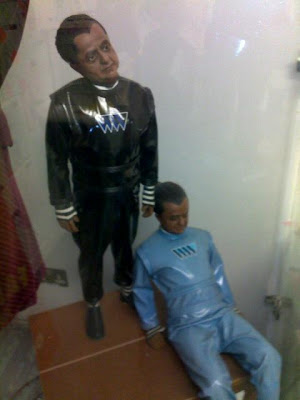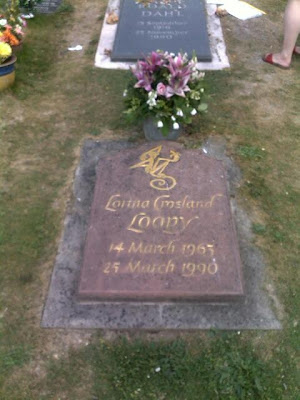I'm not very practical. I can wire a plug, wash the dishes and reach things from high shelves, but that's where my skills come to an end. In my teens, reading
John Wyndham's cosy catastrophes – where the world was taken over by Triffids, Krakens and Cuckoos, or
the grass all died – I knew I'd have been one of the first victims.
The heroes were plucky, self-reliant types who understood the workings of houses, motorcars and guns, and were probably schooled at
Bedales. Part of the appeal of Wyndham's heroes – and James Bond, John Hannay, Sherlock Holmes and Doctor Who – is that very expertise. We see through their eyes or tag along at their side, enjoying the adventure all the more for their insight.
I think that's why I've given up on the
new version of Survivors, where there seems little interest in the practicalities of surviving, and it's all about big revelations and people feeling betrayed. How do these people eat, clean their clothes or still have pretty hair? It doesn't feel much of a struggle to survive, it's just that other characters are a bit annoying.
That's not true of two books read in the last 10 days, where the vivid and terrifying atmosphere of each is all about the struggle.
Tom Rob Smith's Child 44 is an extraordinary debut, well deserving its myriad praises. As the blurb says,
“In Stalin's Soviet Union, crime does not exist. But still millions live in fear. The mere suspicion of disloyalty to the State, the wrong word at the wrong time, can send an innocent person to his execution.”
Officer Leo Demidov is an idealistic war hero in Stalin's Soviet Union, but starts to spot links between crimes that have already been solved. But it's treason to suggest that the State's got something wrong, and even before he starts pursuing a serial killer his wife and parents are at risk...
It's an enthralling read, the terror of everyday life under Stalin just as thrilling as the crime plot. It's packed with detail, of the presumption of guilt, the scale of numbers killed, the methods used to get confessions. Everyone, we're told, knows someone who's been arrested – and so, implicitly, killed. We see the effect of this six-degrees of separation, as a whole population waits to be incriminated.
The short chapters, constant tension and twists keep the reader entirely absorbed – we have to know if Leo can solve the case but also if he can survive.
“I wanted to write a book that was as exciting as 24, a page-turner in the way that show is compulsive.”Tom Rob Smith, “Q&A”, in Child 44, p. 476.
The influence of
24 is very evident, and good, first-season
24 at its best, grounded in sordid reality and tricky moral dilemma. Every few pages some character is faced with some awful decision, forced to do terrible things just to get through the day. There are constant threats and revelations, and the short chapters make it hard to put down because you know you can just get a bit more. (It reminded me, oddly, of
Dahl's The Magic Finger, which as a small child I could proudly read in one sitting.)
For the first 150 pages we follow Leo as he carries out his duties, oblivious to a plot that will link up the various incidents and characters. It's still some time before we understand the title, but ever page is thrilling. Some 300 pages in we're told the identity of the killer, so the book suddenly becomes about whether that person can be stopped and how many more people will die.
There's some odd stuff where we jump between the points of view of different characters while we're in the same section. I know other books do that, but understand the convention of Doctor Who books that we stay behind one pair of eyes until there's an evident break. And the book is relentless, humourless and grim. For the most part the only time anyone shows any kindness is for selfish reasons, a set-up for something awful.
Then, on page 370, with a hundred pages to go, I thought it would all come apart. There's a revelation about the killer (one I'd already suspected) that seems a terrible coincidence. It's explained later, and sort of buys back its credibility, but it's also like
24 and its worst. Likewise, the ordinary people at the end who risk their lives to help Leo feels a bit like it comes from nowhere and contradicts what we've already seen. If just one of these later characters had betrayed our hero I would have bought it more.
That said, Smith nicely suggests the ordinary people toeing the party line only to survive. The presumption of the State seems to be that life is meagre and hard, and should be in service of the nation. But this is 1953, while the US is all convenience and kitchen appliances, and the UK is just starting to see
the end of post-war austerity. Smith shows his ordinary Russians struggling to provide comforts for their families and loved ones. It's not just that they'd see – and voice – flaws in the system because they saw images from the West. They can see the unfairness of State officials, who have better homes, hot water, real chocolate. No one would choose discomfort over comfort (at least, not for their loved ones). And if they can't choose it's only a question of time before they take it. That's not to say that the end of socialism was inevitable, but that when a system's not working, no amount of pressure from the State is going to hide that from the people.
Anyway, despite some minor reservations, it's a brilliant book, and I look forward to getting my mitts on the follow-up,
The Secret Speech.
“Okay. This is what the good guys do. They keep trying. The don't give up.”Cormac McCarthy, The Road, p. 145.
I nicked the title of my
Being Human book from a
TV thing by Nigel Kneale, and only heard about this book and film when mine had been announced. So I thought I better read it (and anyway,
No Country For Old Men is made of splendid).
The unnamed father and his unnamed son trudge across terrain we slowly realise is in nuclear winter, a cold world strewn with ash and the horrific burnt remnants of firestorms, the sun ever-hidden by the grey. Whatever happened happened many years ago – around the time that the son was born. They scavenge meagre remains, huddle to keep warm and hope not to be caught by the cannibals...
It's an exhausting, wearying book, simply and vividly told. The simplicity just adds to the atmosphere of gloom – there's little else to be said. The trials of lighting a fire or getting caught in the rain are just as moving as the occasional scary moments on the road when they come across other survivors. Like Child 44, the short sections (and no chapters) mean it's difficult to give up the trudge; we can always plod another step further.
It reminds me a little of
In The Country of Last Things and also
On The Beach, but it's also probably not a wise book to read if you're plodding through heavy life stuff of your own. The man's ever more desperate effort to keep moving down the road are ultimately less heroic as futile. Harrowing, vivid and ouch.
















